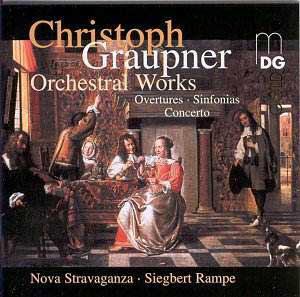That the music of Christoph Graupner is not better known is
due entirely to a unique and curious set of circumstances. Certainly he
is not another mediocre baroque composer who it would be best to keep
silent.
After a successful apprenticeship as an opera composer,
his fame came to the attention of Ernst Ludwig of Hesse-Darmstadt. Graupner
worked for him for 1709, establishing a theatrical tradition and writing
motets. However lack of funds curtailed these activities and sadly his
music did not outlive him. The story goes as follows and I quote from
the excellently compiled noted by Oswald Bill.
After Graupner’s death "his compositions became
a bone of contention between his legal heirs and the ruling landgrave.
The question of ownership was never settled, and his music was locked
away and forgotten. The long legal wrangles did bring one advantage,
however; his work remained together and is today preserved … in Darmstadt"
His music, newly discovered, is now attracting attention.
Each of the pieces on this CD shows individuality,
spontaneity and more than a little spark of genius. The ‘Overture-Suites’
(dated, as the earliest works on the CD, to 1736) may strike some as
having a parallel with Telemann. They both start with the longest movement,
confusingly also called an Overture, in a French style. This is followed
by a series of French movements. Indeed Rameau is sometimes not too
far away both in the quality of the instrumental writing and in the
odd titles given to certain movements. The E flat suite has a Rigaudon
and a movement marked ‘L Intrepidezza’. It ends with ‘L’Inessorabilata’
which is a unique attempt at juxtaposing a strong rhythmic idea on strings
with a more feminine gentle one on flutes. These ideas never attempt
to meet a compromise but simply are played side by side. This, in microcosm,
sums up the extraordinary 20-minute suite itself with its stylistic
contrasts. The E major Ouverture has a delicate and absorbing Tombeau,
which I deeply love. This suite is also a joy because it incorporates
the marvellous playing of Saskia Fuikentscher and Christine Allanic
on oboe d’amore.
The two Sinfonias (dated 1752 and 1748) are three movement
works of less than ten minutes duration. Not a note is wasted and emotionally
they are direct and memorable. The G major one ends curiously in a ternary
form double-minuet movement, as Haydn was occasionally to do in the
1760s.
Most exciting of all, in my view, is the four movement
concerto featuring early on the two flutes in the delicious and all
too short opening Largo. The two faster movements make up twelve and
a half minutes of this fifteen and a half minute work. The second movement
begins as a fugue and the orchestra would have it as such but the solo
instruments refuse to join in and instead play a series of wheeling
canons. The last movement is a delightful virtuoso exercise for the
flutes.
The performances are quite excellent. This group was
founded some fourteen years ago. Period instruments are used and details
on each are clearly given. The direction by Siegbert Rampe from the
harpsichord (1755 Johann Their) is never obtrusive and the speeds are
ideal especially in the slow music.
As a somewhat sceptical reviewer when another little
known baroque composer pops up I feel too often that much of the music
is over praised. But on the evidence of this disc I shall be looking
out again for Christoph Graupner and I would advise you dear reader
to do the same.
Gary Higginson


